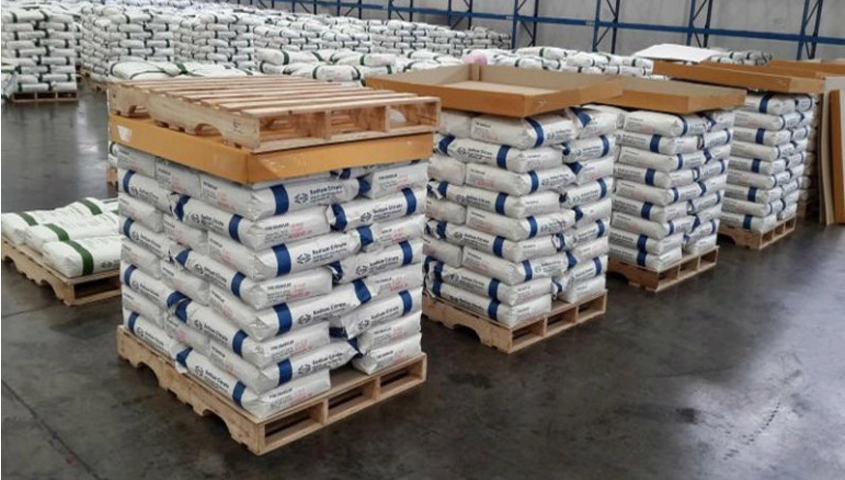Citric Acid Supplier From Turkey and Dubai-UAE

- What Is Citric Acid (C₆H₈O₇)?
- Physical and Chemical Properties of Citric Acid
- Citric Acid Applications by Industry
- Handling, Safety and Storage
- Citric Acid Packaging and Bulk Options
- Why Choose Us as Your Citric Acid Supplier?
- Related Products: Sulfuric Acid and Stearic Acid
- Contact Us for Citric Acid Supply
As a professional citric acid supplier, we provide high‑quality bulk citric acid (C₆H₈O₇) to food, beverage, pharmaceutical, personal care, cleaning and industrial customers worldwide. Our citric acid is produced by controlled fermentation processes, ensuring consistent purity, performance and regulatory compliance.
Citric acid is a weak organic tricarboxylic acid naturally occurring in citrus fruits such as lemons, limes and oranges. In industry, it is widely used as a food‑grade acidulant, preservative and chelating agent, typically supplied as a white, crystalline, odorless powder with a characteristically sour taste.
- CAS No. (anhydrous): 77‑92‑9
- CAS No. (monohydrate): 5949‑29‑1
- Food additive code: E330
What Is Citric Acid (C₆H₈O₇)?
Citric acid is a tricarboxylic acid containing three carboxyl (–COOH) groups and one hydroxyl (–OH) group. This molecular structure gives citric acid its acidity and strong ability to bind metal ions.
We supply citric acid in two main forms:
- Anhydrous citric acid
- No water of crystallization
- Suitable for dry blends and applications sensitive to moisture
- Citric acid monohydrate
- Contains one molecule of crystal water
- Widely used in food, beverage and pharmaceutical formulations
As your bulk citric acid supplier, we can recommend the most suitable form and grade for your specific process and application.
Physical and Chemical Properties of Citric Acid
- Molecular formula: C₆H₈O₇
- Molecular weight:
- Anhydrous: 192.13 g/mol
- Monohydrate: 210.14 g/mol
- Appearance: White, crystalline, odorless powder
- Taste: Strongly sour
- Solubility in water: ~1460 g/L at 20°C (highly soluble)
- pH (1% solution): ~2.2
- Decomposition temperature: Around 153°C (decomposes on heating rather than cleanly melting)
Key performance features:
- Excellent water solubility
- Non‑toxic and biodegradable profile
- Strong chelating ability for metal ions
- Effective buffering and acidulating properties
These characteristics make citric acid one of the most versatile organic acids available from any citric acid supplier.
Citric Acid Applications by Industry
Food and Beverage (E330)
Citric acid is one of the most widely used food additives globally.
- Acidulant and flavor enhancer:
Provides a fresh, tangy taste in soft drinks, juices, candies, jams, jellies and frozen desserts. - pH regulator:
Adjusts and stabilizes acidity, influencing flavor, color, gel strength and texture. - Preservative and antioxidant synergist:
Inhibits certain microorganisms and binds trace metals that catalyze oxidation, helping extend shelf life and maintain product quality.
We supply food‑grade citric acid that complies with major food standards. As your citric acid supplier, we can support you with documentation such as COA, SDS and, on request, Halal/Kosher certificates.
Pharmaceutical and Healthcare
In pharmaceutical applications, citric acid is used both as an excipient and as a reactive component.
- Buffering agent:
Maintains optimal pH in syrups, oral solutions, tablets and injectable formulations. - Effervescent component:
Reacts with carbonates/bicarbonates in effervescent tablets and powders to generate carbon dioxide and promote rapid dissolution. - Anticoagulant:
Included in certain blood collection solutions and laboratory reagents to prevent clotting.
Pharma customers typically require tight quality control, low impurity levels and full traceability. We work closely with clients as a reliable citric acid supplier to meet these demands.
Cosmetics and Personal Care
Citric acid plays several roles in cosmetic and personal care products.
- pH adjuster:
Fine‑tunes pH levels in creams, lotions, shampoos, conditioners and facial cleansers. - Mild exfoliant (AHA):
Acts as a gentle alpha hydroxy acid, helping improve skin tone and texture when used appropriately. - Stabilizer and antioxidant helper:
Supports product stability by controlling pH and binding metal ions that can trigger oxidation.
We supply cosmetic‑grade citric acid suitable for a wide range of formulations. Many customers also use Stearic Acid in creams, soaps and personal care items as a fatty acid and structuring agent; if you produce such formulations, you can source both citric acid and stearic acid from one supplier to streamline procurement.
Cleaning and Household Products
Citric acid is widely adopted in environmentally conscious cleaning products.
- Descaling agent:
Removes limescale, rust and mineral deposits from kettles, boilers, coffee machines and bathroom fittings. - Stain remover:
Helps remove soap scum, hard‑water stains and some forms of rust from tiles, glass and ceramics. - Mild disinfectant action:
Contributes antibacterial and antifungal activity within properly formulated cleaning products.
In many applications, citric acid offers a biodegradable alternative to stronger mineral acids. For more aggressive industrial cleaning or pH adjustment, some users still rely on Sulfuric Acid, while others choose citric acid when they need a milder, safer option. We can supply both products, allowing you to select the most appropriate acid for each cleaning or process requirement.
Industrial and Technical Uses
Citric acid has a valuable role in many industrial processes:
- Water treatment:
Chelates metal ions and helps prevent scale formation in boilers, cooling systems and industrial water circuits. - Metal cleaning and passivation:
Used to clean and passivate stainless steel and other metals, reducing corrosion and improving surface finish. - Textile and leather processing:
Acts as a pH regulator and dyeing aid in fibers, fabrics and leather treatments. - Other technical uses:
Included in construction chemicals, electroplating baths, detergents and oilfield chemicals, where mild acidity and chelation are required.
As a flexible citric acid supplier, we support both small and large industrial users with customized packaging and logistics solutions, from 25 kg bags up to jumbo bags and full container loads.
Handling, Safety and Storage
Although citric acid is generally recognized as safe (GRAS) when used appropriately in food, it should still be handled with care in concentrated powder or solution form.
Handling Guidelines
- Avoid inhalation of dust; use local exhaust ventilation where needed.
- Wear protective gloves, goggles and suitable clothing to prevent skin and eye contact.
- Follow site‑specific instructions and consult the Safety Data Sheet (SDS).
Storage Recommendations
- Store in a cool, dry, well‑ventilated area.
- Keep away from moisture, direct sunlight and heat sources to prevent caking and degradation.
- Maintain original packaging intact and properly sealed until use.
- Avoid storing near strong oxidizing agents or incompatible chemicals.
Transportation
- Typically classified as non‑hazardous for transport.
- Suitable for shipping by road, sea and air under standard conditions.
- Moisture‑resistant packaging is essential during long‑distance transit.
We provide all necessary product and safety documentation to support safe handling and transport.
Citric Acid Packaging and Bulk Options
As a dedicated bulk citric acid supplier, we offer multiple packaging solutions tailored to different customers and markets.
Standard Packaging
- 25 kg PP woven bags with inner liner
- Strong outer layer and moisture‑resistant liner
- Suitable for food, pharma and industrial applications
- 25 kg kraft paper bags
- Often preferred for food and pharmaceutical industries, depending on liner and local requirements
Bulk Packaging (FIBCs)
- 500 kg jumbo bags (FIBCs)
- 1000 kg jumbo bags (FIBCs)
These bulk bags are ideal for large‑scale users who handle citric acid via automated dosing and bulk storage systems.
All packaging is:
- Moisture‑proof
- Securely sealed
- Compliant with international export and, where necessary, food‑contact standards
Container Loading Capacity
Typical loading for export:
- 20’ FCL: Approx. 20–22 metric tons
- 40’ FCL: Approx. 25–27 metric tons
The exact loading pattern depends on packaging type, palletization and destination regulations; we can provide optimized loading plans with each shipment.
Why Choose Us as Your Citric Acid Supplier?
When selecting a citric acid supplier, it is critical to ensure consistent quality, secure supply and professional service. We focus on:
- Stable quality:
- Strict quality management
- Consistent specifications for anhydrous and monohydrate citric acid
- Regulatory compliance:
- Food and, where required, pharma-compliant grades
- Documentation including COA, SDS and other certificates (e.g., Halal/Kosher on request)
- Flexible packaging and logistics:
- 25 kg bags and jumbo bags
- Full container load optimization and support with export documentation
- Technical support:
- Guidance on grade selection and application
- Support for formulating products in food, beverage, cleaning, cosmetics and industry
- Related products from one source:
- In addition to citric acid, we also supply Sulfuric Acid for industrial applications and Stearic Acid for cosmetics, plastics, rubber and candle manufacturing, helping you consolidate your chemical sourcing.
Partnering with us as your citric acid supplier helps you reduce supply risk, maintain consistent product performance and improve overall procurement efficiency.
Related Products: Sulfuric Acid and Stearic Acid
To support customers who prefer to work with a single, reliable chemical supplier, we also offer:
- Sulfuric Acid
A strong mineral acid widely used in fertilizer production, metal processing, battery manufacturing and pH adjustment in various industrial processes. In some cleaning and industrial applications, it is used alongside or as an alternative to citric acid, depending on the required acidity and process conditions. - Stearic Acid
A saturated fatty acid widely used in soaps, candles, rubber and plastic processing, and as a thickener or structuring agent in cosmetics and personal care products. Many formulators use citric acid for pH control and stearic acid for texture and stability within the same product line.
By sourcing citric acid, sulfuric acid and stearic acid from one supplier, you can simplify procurement, logistics and quality management across multiple product lines.
Contact Us for Citric Acid Supply
If you need a dependable citric acid supplier for food, beverage, pharmaceutical, cosmetic, cleaning or industrial applications, contact us for detailed specifications, samples and quotations. We are ready to support your requirements with quality products, flexible packaging and reliable logistics.

